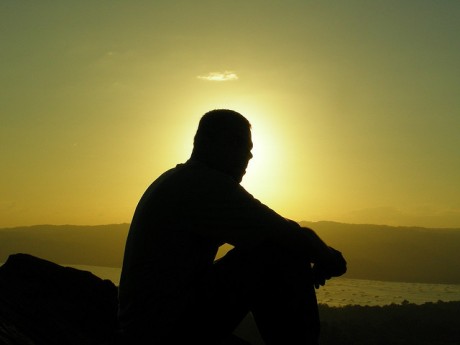We have all read that Love is patient and kind, Love is not jealous or boastful, arrogant or rude. Love does not insist on getting its own way. Love hopes all things (1 Cor. 13). So explain to me how love of God and love of neighbor can ever be expressed as a commandment? I can command a child to eat their peas, but I cannot command the child to love me or anyone else.
So how do we make sense of this impossible sounding, greatest commandment to love God with our whole heart, mind and soul and our neighbor as ourselves? It must be that the love is there already within us, often hidden. It must be like commanding a bird to fly, a fish to swim or a child to play. It must be already there.
Tell a Bird to Fly
At the very core of our tradition is this person who is fully human and fully God. You cannot separate the two. Jesus came to tell us we also have the divine embedded in us, which Thomas Merton called the “diamond of pure light.” Thus, there is part of each of us that, this very day, this very hour, loves God with our whole heart, our whole mind and our whole soul. There is a part of you that follows the Golden Rule and loves your neighbor as yourself. This is not something awarded to us for behaving correctly, for studying about God, for believing correctly. This not something awarded after a lifetime of faith. It is not something that can be removed. It is who we truly are.
The first reading shows us what happens if we separate God from the human. I grew up with lots of brothers and sisters and our greatest leverage with each other was to tattle to my father when he got home. This is essentially the spiritual imagination of the folks in the first reading. God is out there somewhere. Those who make enough noise, particularly for a righteous reason, can get God’s attention. Woe to you if God does not like what God sees or hears about you.
If part of us loves God with our whole heart, mind and soul and our neighbor as ourselves then you might expect diverse religious folks to encounter it and share similar news. Karen Armstrong has written a book called “Twelve Steps to a Compassionate Life,” in which she finds the Golden Rule in EVERY major religion, even those with lots of gods. In fact, she credits Confucius as the first to write down the central rule to love our neighbor as ourselves hundreds of years before Jesus.
This makes total sense to me if God is embedded in everyone. Everyone has the diamond of pure light. No exceptions. It seems everyone who seeks consciousness and awareness of the inner life, regardless of tradition or culture, comes to the same conclusion that compassion is the bottom line.
If part of us already loves God and neighbor you might expect this insight to pop up now and again in the culture. In our culture the musicians sometimes “get it” before the churches. A few years ago there was a wildly popular country music song entitled “I Am Already There” about a working father calling home from a lonely hotel room to his wife and kids. He tells his wife a refrain that has echoed spiritual truth for many:
I’m already there. Don’t make a sound.
I’m the beat in your heart,
I’m the moonlight shining down.
I’m the whisper in the wind,
And I will be there to the end.
Can you feel the love that we share?
Oh, I’m already there.
Oh, I am already there.
Millions of people had clicked on to these lyrics before me. We seem to know in some deep place that this is what Love is like, this is what God is like.
Barriers to Flight
If the love of God and neighbor is already there, like wings on a bird, why is there not more flying going on? The myths from a simpler age speak to this quandary. The ancient myths often spoke of a “treasure” hidden in the woods or the mountains guarded by a monster or a wild animal of some kind. The hero would need to defeat or avoid the monster to release the magic of the treasure.
Today we would use more psychological language to describe the “monster.” Albert Haase in his book on the false-self, cleverly summarizes what is guarding our treasure as the “Empty Ps” – Power, Prestige, Position, Popularity, Productivity, Possessions. All these things, not evil in themselves, seek separation and are frightened of the treasure available within. These things need to be confronted and put in their proper place if we are to fly.
In a moment we will be considering bread and wine that will become for us the body and blood of Jesus. We cannot separate the presence of God from the presence of the food and drink. They are inseparable. If we can believe in this union in such simple elements, why is it so hard for us to believe in this union in the mystery of our own humanness? We come back to this table over and over to remind ourselves God is already there, inseparable from us, longing for us to fly.
Amen
George von Stamwitz
Sts. Clare & Francis Ecumenical Catholic Community
Liturgy for the 30th Sunday of Ordinary Time
Saturday Evening, October 25, 2014
Focus text: Matthew 22:34-40 (The Greatest Commandment)
Photo by Susanne Nilsson on flickr.com


